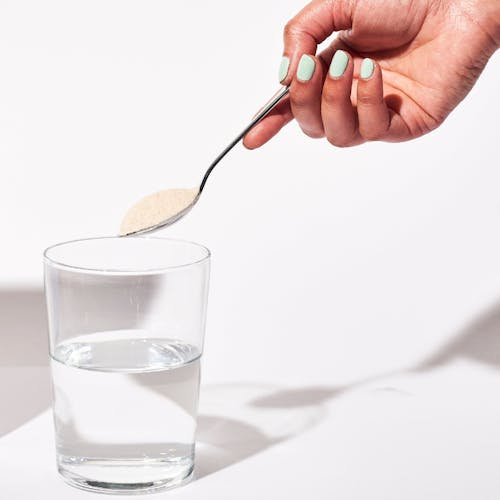This website uses cookies to enhance the user experience. By using Yoppie you are agreeing to our use of cookies.
The PCOS, Insulin Resistance & Diet Connection
Written by Yoppie
08 Apr 2022
What is PCOS again?
What is insulin resistance, and why is it related to PCOS?
Why is diet so important with insulin resistant PCOS?
Can a diet change reduce my PCOS symptoms?
Ughhh… that sounds hard…
What else can I do to help with PCOS?
You know how much we love to demystify all things PCOS here on the Full Stop blog, which is why we’re revisiting the link between that and insulin resistance, this time with an emphasis on diet. Let’s take a look at how they’re connected, how adjusting your eating habits can help compensate for insulin resistance, and how this can reduce symptoms.
What is PCOS again?
PCOS is a common condition which affects ovarian function, and due to higher amounts of the hormone androgen, it can lead to irregular periods, excess body hair growth, and enlarged ovaries that cause fertility issues. Symptoms aren’t always noticeable, and many people with PCOS don’t even know they have it - one study found up to 70% of people with PCOS had not been diagnosed.
What is insulin resistance, and why is it related to PCOS?
Great question - there are different kinds of PCOS, but the most common (affecting up to 70% of all people with PCOS) is insulin resistant PCOS. Insulin resistant PCOS is when the body can make insulin but can’t use it effectively, which can lead to PCOS symptoms and an increased risk of type 2 diabetes.
Why is diet so important with insulin resistant PCOS?
Whether you have a positive or negative relationship with food, it can be difficult to begin to change eating habits. With insulin resistant PCOS, the benefits of improving your diet and exercise can’t be overstated, as it’s so closely related to type 2 diabetes and therefore opens up many potential health concerns if left untreated. A 2012 UK study found the risk of developing type 2 diabetes was higher in people with PCOS, and research in Australia found those with PCOS were up to 8.8 times more likely to develop type 2 diabetes.
Weight is also a key factor in managing PCOS, as being overweight tends to exacerbate symptoms. Although studies have found people with PCOS are more likely to be overweight, it’s not always the case, so keep in mind PCOS and type 2 diabetes could be a concern no matter your BMI.
Can a diet change reduce my PCOS symptoms?
It can indeed! Research has found diet has strong links to improvements in insulin resistance in PCOS patients, with the DASH diet and calorie-restricted diets being the most effective choices. Other sources have concluded there are three diets that may help people with PCOS to manage symptoms. Let’s take a look:
- A low glycemic index (GI) diet: The body digests low GI foods at a slower pace so they don’t raise insulin levels as much or as quickly, like some carbohydrates do. Low GI foods include whole grains, legumes, fruit, seeds, nuts, starchy veggies and unprocessed foods. Studies have found a keto diet could positively impact PCOS symptoms, such as fertility issues.
- An anti-inflammatory diet: Anti-inflammatory foods like fatty fish, leafy greens, berries and extra virgin olive oil can reduce PCOS symptoms like fatigue.
- The DASH diet (AKA, Dietary Approaches to Stop Hypertension): This diet is often recommended to reduce the risk of heart disease, but it’s also helpful for managing PCOS symptoms. It focuses on fish, poultry, fruit, veggies, whole grains and low-fat dairy, and avoids foods high in saturated fat and sugar.
Ughhh… that sounds hard…
If you’re not ready for a complete diet overhaul, and instead you want to try cutting out a few of the ‘bad’ foods, there are some simple swaps you can make. We’ve already covered on the blog how a plant-based diet could potentially improve symptoms of PCOS, as well as how alcohol fares, but let’s look at exactly what to avoid and what to add into your diet.
You’ll want to avoid refined carbohydrates that can cause inflammation and exacerbate insulin resistance. As a general rule, anything highly processed is usually high in refined carbs, such as white bread, pastries, sugary desserts, things made with white flour, pasta and noodles - look out for ingredients like semolina, durum flour or durum wheat flour as these are usually high in carbohydrates and low in fibre.
It’s also best to limit your added sugar, and this often appears on labels with names like sucrose and dextrose. Try to limit fizzy drinks, juice and sweets, and limiting processed foods should also help you cut some sugar, since there is often a lot added to these meals.
If you’re wondering what to eat instead, it’s all about high fibre, baby! Veggies like broccoli, cauliflower and Brussels sprouts are great, as well as red leaf lettuce, green and red peppers, beans, lentils, almonds, berries and sweet potatoes. You may also want to up your intake of anti-inflammatory foods like turmeric, kale, spinach, walnuts and blueberries.
What else can I do to help with PCOS?
Lifestyle changes can have a big impact when managing PCOS symptoms, and research has found time and time again that dietary changes and physical activity together can help with weight loss, improve insulin metabolism, make periods more regular, better balance the levels of hormones in your system, and lower cholesterol levels.
Look at how you spend your time and find small changes that can improve your overall health. Could you walk to work? Swap your regular pasta for a lentil-based alternative? Go to bed an hour earlier each night to get more sleep? Improving your overall health can help reduce frustrating PCOS symptoms, and have you feeling better in just a few weeks.
Got a question about PCOS, insulin resistance and diet? We’re all ears! Let us know what’s on your mind and how we can help. Get in touch with us and others in our Full Stop FB group, or speak to us directly on Instagram at @itsyoppie. Don't forget that our personalised menstrual care subscription can get organic tampons, supplements for PCOS, and much more, delivered easily and regularly through your letterbox, to help keep at least some of that PCOS pain under control each month.
Section jump
Back to top
Subscribe To Our Newsletter
YOPPIE





© 2026 Yoppie is a registered trademark of Phlo Technologies Ltd.
Yoppie's supplements are not a substitute for a varied diet and healthy lifestyle and are not intended to diagnose, treat, or cure any disease. If you are pregnant, breastfeeding, have a medical condition or are under medical supervision, please consult with your doctor before taking any of our products.








